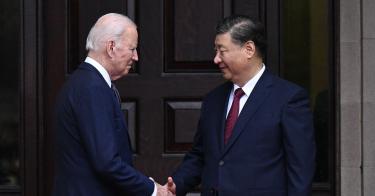风萧萧_Frank
以文会友中国拉拢非洲,美国却在说教
2024年9月23日 戴安娜·弗希特戈特-罗斯 Diana Furchtgott-Roth 能源、气候与环境中心主任,也是赫伯特和乔伊斯·摩根研究员。
https://www.heritage.org/china/commentary/china-woos-africa-while-america-lectures
拜登总统于2023年11月15日与中国国家主席习近平会面。
关键要点
中国明智地向非洲——世界上人口增长最快的大陆——示好。
中国通过倾听非洲国家的需求,而不是对他们指手画脚,成功地与非洲国家进行了接触。
为了重新获得这种影响力,美国必须关注非洲的需求,例如改善廉价能源、商业和安全。
如果对本月出席在北京举行的第九届中非合作论坛峰会的50位非洲领导人进行民意调查,问他们对美国和中国哪个国家更看好,他们肯定会选择后者。
谁又能责怪他们呢?习近平主席向他们提供了510亿美元的贷款和100万个就业岗位,同时大力推广长城汽车的汽油动力皮卡、小型货车和SUV。相比之下,美国却要求他们遵守美国在气候变化、性别平等和其他国内政治方面的目标。
中国明智地向非洲——世界上人口增长最快的大陆——示好。诚然,非洲贫困程度最高,能源供应最匮乏,基础设施最不发达,工业化水平也最低。然而,它也拥有丰富的自然资源来推动其增长,以及发达经济体所需的具有战略意义的矿产资源。
正如第九届中非合作论坛所显示的那样,中国在与非洲的接触和贸易方面领先于美国。中国的发展议程侧重于提供投资、基础设施建设和贸易,以换取非洲矿产、土地、粮食生产以及港口、公路和铁路等战略资产的权利。
美国指令造成的危害的一个例子是南非科马蒂燃煤电厂将于2022年关闭,该电厂由世界银行提供的4.97亿美元贷款资助。可再生能源本应弥补电力和就业岗位的损失,但至今尚未建成。电厂关闭导致工人失业,由于电力短缺,科马蒂电厂所在地姆普马兰加省城镇的商业活动急剧减少。
西方国家向南非公平能源转型伙伴关系投资计划提供的80亿美元(其中包括拜登-哈里斯政府提供的10多亿美元)拨款,旨在用可再生能源取代燃煤发电,但该计划最终失败了。
南非总统委员会得出结论,科马蒂燃煤电厂的关闭处理不当。垄断南非电力供应的南非国家电力公司(Eskom Group)首席执行官丹·马罗坎(Dan Marokane)表示:“现在对此已经毫无疑问。我们所有人都一致认为,不应重蹈科马蒂的覆辙。” 该电厂不发电,科马蒂的原工人也失去了工作。
2023年,南非总统西里尔·拉马福萨(Cyril Ramaphosa)根据总统气候委员会的报告,就该国日益严重的电力短缺发出警告。Eskom造成了南非有史以来最严重的轮流停电,导致居民区停电、制造业中断、企业受损。
但西方国家仍在不断向他们推销清洁能源。本周,欧盟承诺向南非提供两笔总额为3500万美元的拨款,用于发展绿色氢能项目。这项技术成本高昂,生产过程中消耗的能量是发电量的两倍。
中国通过倾听非洲国家的需求,而不是指手画脚,成功地与非洲国家进行了接触。这使得中国能够从马里、津巴布韦和刚果民主共和国等国购买关键矿产。
通过在非洲和其他地区的业务,中国控制着全球38%的稀土元素、60%的稀土矿开采、85%的稀土加工、90%的稀土永磁体制造以及80%的钴精炼产能。这使得中国在生产太阳能组件和电池方面拥有比较优势。
非洲领导人对通用汽车公司(GMW)生产的高级汽油动力汽车以及中国承诺的数十亿美元的化石燃料发电投资表示赞赏。难怪中国在非洲的影响力增强,而美国却丧失了影响力。
为了重新获得这种影响力,美国必须关注非洲的需求,例如改善廉价能源、商业和安全。这将使非洲能够发展高效的现代经济,创造一个犯罪和恐怖主义得到控制的安全环境,以及保护个人和财产权利的法治。这不仅对非洲有利,也对美国的国家安全有利。
本文最初发表于《国家安全法》
China Woos Africa While America Lectures
Diana is Director of the Center for Energy, Climate and Environment and the Herbert and Joyce Morgan Fellow.

President Biden greets Chinese President Xi Jinping on November 15, 2023.BRENDAN SMIALOWSKI / Contributor / Getty Images
KEY TAKEAWAYS
China is wise to court Africa, the continent with the fastest growing human population in the world.
China is succeeding in engaging African countries by listening to what they want, rather than telling them what they should be doing.
To regain this influence America must focus on the needs of Africa, such as improving affordable energy, business and security.
If you were to poll the 50 African leaders who attended this month’s Ninth Forum on Africa-China Cooperation Summit in Beijing which nation they view more favorably, the United States or China, they’d surely pick the latter.
And who could blame them? President Xi Jinping offered them $51 billion in loans and a million jobs while promoting gasoline-powered pickup trucks, minivans, and SUVs by Great Wall Motors. The U.S., by contrast, is requiring them to adhere to American goals for climate change, gender equality and other aspects of American domestic politics.
China is wise to court Africa, the continent with the fastest growing human population in the world. Yes, Africa has the most poverty, the lowest access to energy, the least developed infrastructure and among the lowest levels of industrialization. Yet it also contains vast natural resources to power its growth, and strategically vital minerals needed by advanced economies.
As the Ninth Forum showed, China is ahead of America in engaging and trading with Africa. China’s developmental agenda focuses on providing investment, infrastructure development and trade in return for rights to African minerals, land, food production and strategic assets such as ports, roads and railroads.
An example of the harm that American directives are causing is the 2022 Komati coal-fired power plant closure in South Africa, funded by a $497 million loan from the World Bank. Renewable energy was supposed to replace both lost power and lost jobs, but it hasn’t been built. The plant’s closure has left workers unemployed and, with electricity scarce, commercial activity has dramatically declined in towns in the Mpumalanga Region, where the Komati plant is located.
Western grants of $8 billion (including over $1 billion from the Biden-Harris administration) to the South Africa Just Energy Transition Partnership Investment Plan, which aims to replace coal-fired power with renewables, have been a failure.
A presidential commission in South Africa concluded that the closure of the Komati coal fired plant was mishandled. CEO Dan Marokane of the Eskom Group, which has a monopoly on the provision of electricity in South Africa, said, “There is now no confusion about this. All of us are now aligned that we should not repeat Komati.” The plant produces no power, and the former Komati workers don’t have jobs.
In 2023 South Africa President Cyril Ramaphosa, following a report by the Presidential Climate Commission, issued a warning over the country’s increasing amount of power shortages. Eskom produced the nation’s worst rolling blackouts on record, shutting down residential areas, disrupting manufacturing, and harming businesses.
But the West keeps pushing clean energy on them. This week the European Union pledged to give South Africa two grants worth $35 million to produce green hydrogen projects, a costly technology that uses twice as much energy to make as it produces in electricity.
China is succeeding in engaging African countries by listening to what they want, rather than telling them what they should be doing. This enables China to buy critical minerals from countries including Mali, Zimbabwe, and Democratic Republic of the Congo.
Through operations in Africa and elsewhere China controls 38% of global rare earth elements and 60% of rare earth mining, 85% of rare earth processing, and 90% of rare earth permanent magnet manufacturing, as well as 80% of cobalt refining capacity. This enables China to have a comparative advantage in producing solar components and batteries.
African leaders appreciate the executive gasoline powered vehicles from GMW and the billions for fossil fuel power promised by the Chinese. No wonder that China has gained influence and America has lost influence in Africa.
To regain this influence America must focus on the needs of Africa, such as improving affordable energy, business and security. This will allow Africa to develop productive modern economies, a secure environment where crime and terrorism is under control, and the rule of law to protect individual and property rights. Not only will this be best for Africa, but also for the national security of the United States.
This piece originally appeared in National Security Journal





